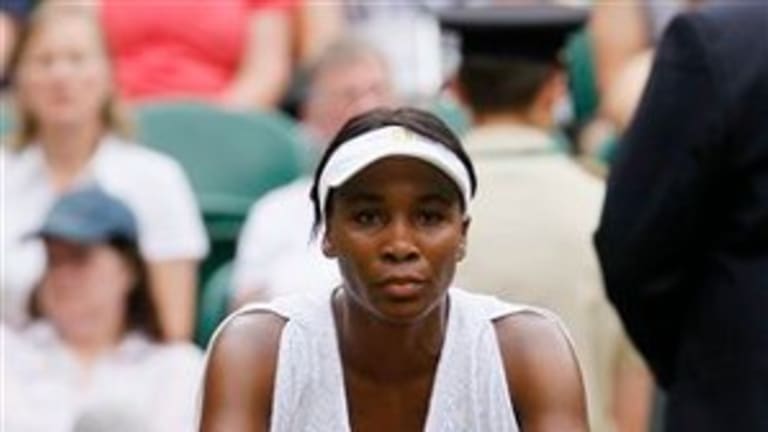!201106270955357357837-p2@stats_com by Pete Bodo
LONDON—No era or dynasty ends on a specific day, although sometimes it may appear to. Who can forget the day the Berlin Wall came crashing down? Or that image of the last helicopter, taking off from the roof of the American embassy in Saigon with people hanging onto it? Yesterday, the day when Venus and Serena Williams both crashed out of Wimbledon within hours of each other, felt a little bit like one of those days.
It was a hectic, hot, humid day, a day when the air clung to your skin and the sky was right there above your brow, slightly portentious and somewhat oppressive. That, coupled with the fact that the sisters both lost in straight sets to women who didn't have a Grand Slam title between them (as opposed to Venus and Serena, who have a combined total of 20), probably helped advance that notion—one which Serena dealt with firmly if not with her trademark aggression when the question was put to her bluntly by a member of the press:
What would you say those who question whether this is the end of an era in terms of the Williams sisters dominance?
Serena replied, "I don't know. Like, I'm still here. I plan on doing better."
It was a good answer, not at all defensive. But it left me wondering, just what price is either sister willing to pay in order to add to her resume? For it's unlikely to get much easier from here on in, partly because Venus is over 30 and Serena rapidly approaching that landmark. And there have been signs this year, particularly in these last two major events, that the other women in the WTA are ready to move on. Ready to really challenge Venus and Serena in a way they would not have dared—in fact, did not dare—under less favorable circumstances a few years ago.
My own reaction to the twin losses yesterday was a mild touch of melancholy. Maybe it was just that the results once again confirmed the relentless passage of time. Wasn't it just yesterday that Serena was tromping around in that ridiculous biker outfit she auditioned at the U.S. Open? What happened to willowy and lithe Venus, running down and whacking a ball so acrobatically that the WTA chose to make its logo out of the negative?
It didn't help that throughout the press room here at Wimbledon, reporters were scurrying around and firing out stats at each other—first time in 93 years that all eight quarterfinalists are European! First time the sisters lost on the same day since—French Open, 2008! A reporter laid that trap for Venus during her presser, knowing the answer full well when he asked: When was the last time you and your sister both went out on the same day of a tournament?
